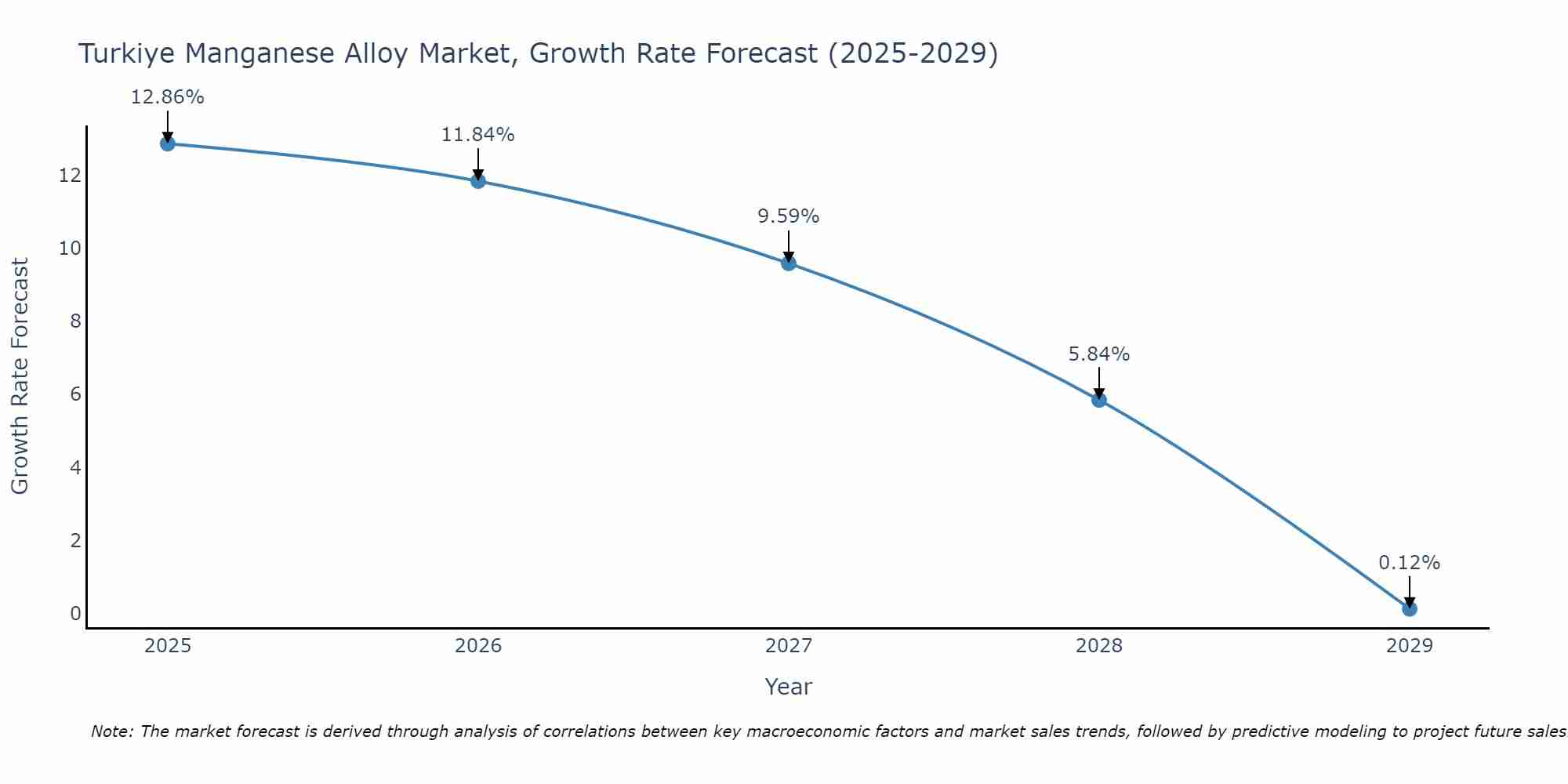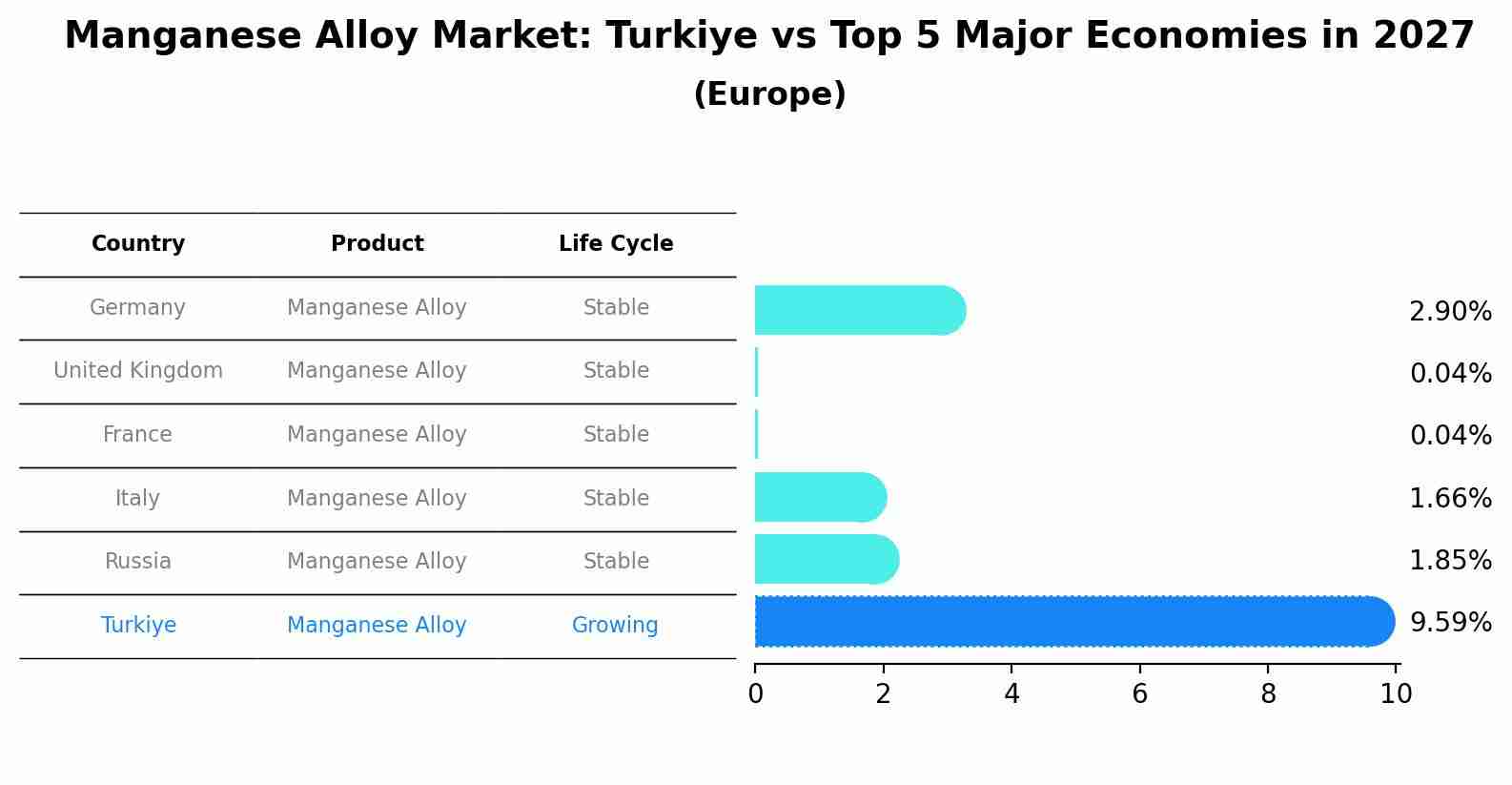Turkey Manganese Alloy Market Outlook | Size, COVID-19 IMPACT, Trends, Growth, Industry, Companies, Value, Forecast, Share, Revenue & Analysis
| Product Code: ETC091857 | Publication Date: Jun 2021 | Updated Date: Jun 2025 | Product Type: Report | |
| Publisher: 6Wresearch | Author: Shubham Deep | No. of Pages: 70 | No. of Figures: 35 | No. of Tables: 5 |
Turkiye Manganese Alloy Market Size Growth Rate
The Turkiye Manganese Alloy Market could see a tapering of growth rates over 2025 to 2029. Starting high at 12.86% in 2025, the market steadily declines to 0.12% by 2029.

Manganese Alloy Market: Turkiye vs Top 5 Major Economies in 2027 (Europe)
In the Europe region, the Manganese Alloy market in Turkiye is projected to expand at a growing growth rate of 9.59% by 2027. The largest economy is Germany, followed by United Kingdom, France, Italy and Russia.

Turkey Manganese Alloy Market Overview
The Turkey Manganese Alloy Market is characterized by steady growth due to the country`s strong industrial base and increasing demand for steel production. Manganese alloys, such as ferromanganese and silicomanganese, are essential additives in steelmaking to enhance the properties of the final product. The market is primarily driven by the construction, automotive, and infrastructure sectors, which rely heavily on steel products. Key players in the Turkey Manganese Alloy Market include local producers like Ekin Maden, as well as international companies like BORCELIK and Kardemir. Factors such as technological advancements in steel manufacturing processes and the emphasis on sustainable practices are expected to shape the future of the market, with a focus on producing high-quality manganese alloys efficiently and cost-effectively.
Turkey Manganese Alloy Market Trends
The Turkey Manganese Alloy Market is experiencing steady growth due to the rising demand from the steel industry. The increasing construction and infrastructure development projects in the country are driving the need for high-quality steel production, creating a strong demand for manganese alloys. Additionally, the automotive sector`s growth is fueling the demand for manganese alloys used in the manufacturing of vehicle components. Market players are focusing on technological advancements and product innovations to meet the evolving requirements of end-users, such as improved strength and durability. Sustainability and environmental concerns are also influencing market trends, leading to an emphasis on eco-friendly production processes. Overall, the Turkey Manganese Alloy Market is expected to continue its growth trajectory, supported by these key trends.
Turkey Manganese Alloy Market Challenges
In the Turkey Manganese Alloy Market, one of the key challenges faced is the fluctuation in global manganese ore prices, which directly impacts the production costs for manganese alloy manufacturers. Additionally, stringent environmental regulations and compliance requirements add to the operational costs and complexities for companies operating in this market. Another challenge is the intense competition among players, both domestic and international, leading to price wars and margin pressures. The market also faces uncertainties related to trade policies and geopolitical factors, which can impact the supply chain and market dynamics. Overall, navigating these challenges while ensuring cost-efficiency, regulatory compliance, and sustainable growth poses significant hurdles for participants in the Turkey Manganese Alloy Market.
Turkey Manganese Alloy Market Investment Opportunities
The Turkey Manganese Alloy Market presents promising investment opportunities due to the country`s increasing focus on infrastructure development and industrial growth. Manganese alloys are crucial in the production of steel, which is essential for construction projects and manufacturing sectors. As Turkey continues to invest in infrastructure projects and expand its industrial base, the demand for manganese alloys is expected to rise. Investors can explore opportunities in manganese alloy production companies, mining operations, or trading firms that specialize in supplying these materials to the local market. Additionally, with Turkey strategically located between Europe and Asia, there is potential for exporting manganese alloys to neighboring regions, further enhancing investment prospects in this sector.
Turkey Manganese Alloy Market Government Policy
The Turkish government has implemented various policies to regulate the manganese alloy market, with a focus on promoting domestic production and ensuring environmental sustainability. One key policy is the imposition of tariffs on imported manganese alloy products to protect local manufacturers. Additionally, there are strict regulations in place to monitor and control the environmental impact of manganese alloy production, including emissions standards and waste management protocols. The government also provides support in the form of subsidies and incentives to encourage research and development in the industry, aiming to enhance competitiveness and technological innovation within the domestic market. Overall, the government`s policies in the Turkey manganese alloy market are geared towards fostering a sustainable and thriving industry while safeguarding the interests of local producers.
Turkey Manganese Alloy Market Future Outlook
The future outlook for the Turkey Manganese Alloy Market appears promising, driven by factors such as the increasing demand for steel production in the construction, automotive, and infrastructure sectors. Turkey`s strategic location as a bridge between Europe and Asia positions it favorably for trade, further boosting the manganese alloy market. Additionally, the growing focus on sustainable practices and the transition towards electric vehicles are expected to drive the demand for manganese alloys used in battery production. However, challenges such as fluctuating raw material prices and environmental regulations could impact market growth. Overall, with the anticipated growth in end-user industries and the country`s industrial development initiatives, the Turkey Manganese Alloy Market is likely to experience steady growth in the coming years.
Key Highlights of the Report:
- Turkey Manganese Alloy Market Outlook
- Market Size of Turkey Manganese Alloy Market, 2021
- Forecast of Turkey Manganese Alloy Market, 2027
- Historical Data and Forecast of Turkey Manganese Alloy Revenues & Volume for the Period 2018 - 2027
- Turkey Manganese Alloy Market Trend Evolution
- Turkey Manganese Alloy Market Drivers and Challenges
- Turkey Manganese Alloy Price Trends
- Turkey Manganese Alloy Porter's Five Forces
- Turkey Manganese Alloy Industry Life Cycle
- Historical Data and Forecast of Turkey Manganese Alloy Market Revenues & Volume By Type for the Period 2018 - 2027
- Historical Data and Forecast of Turkey Manganese Alloy Market Revenues & Volume By Ferro-Manganese for the Period 2018 - 2027
- Historical Data and Forecast of Turkey Manganese Alloy Market Revenues & Volume By Metallic Manganese for the Period 2018 - 2027
- Historical Data and Forecast of Turkey Manganese Alloy Market Revenues & Volume By Nickel-Manganese Alloy for the Period 2018 - 2027
- Historical Data and Forecast of Turkey Manganese Alloy Market Revenues & Volume By Nitrided Manganese Alloy for the Period 2018 - 2027
- Historical Data and Forecast of Turkey Manganese Alloy Market Revenues & Volume By Silico-Manganese for the Period 2018 - 2027
- Historical Data and Forecast of Turkey Manganese Alloy Market Revenues & Volume By Iron-Manganese Alloys for the Period 2018 - 2027
- Historical Data and Forecast of Turkey Manganese Alloy Market Revenues & Volume By Application for the Period 2018 - 2027
- Historical Data and Forecast of Turkey Manganese Alloy Market Revenues & Volume By Foundry for the Period 2018 - 2027
- Historical Data and Forecast of Turkey Manganese Alloy Market Revenues & Volume By Steel for the Period 2018 - 2027
- Historical Data and Forecast of Turkey Manganese Alloy Market Revenues & Volume By Superalloys for the Period 2018 - 2027
- Historical Data and Forecast of Turkey Manganese Alloy Market Revenues & Volume By Welding Electrodes for the Period 2018 - 2027
- Historical Data and Forecast of Turkey Manganese Alloy Market Revenues & Volume By End-users for the Period 2018 - 2027
- Historical Data and Forecast of Turkey Manganese Alloy Market Revenues & Volume By Medical for the Period 2018 - 2027
- Historical Data and Forecast of Turkey Manganese Alloy Market Revenues & Volume By Mining Industry for the Period 2018 - 2027
- Historical Data and Forecast of Turkey Manganese Alloy Market Revenues & Volume By Chemical Industry for the Period 2018 - 2027
- Historical Data and Forecast of Turkey Manganese Alloy Market Revenues & Volume By Machinery Manufacturing Industry for the Period 2018 - 2027
- Turkey Manganese Alloy Import Export Trade Statistics
- Market Opportunity Assessment By Type
- Market Opportunity Assessment By Application
- Market Opportunity Assessment By End-users
- Turkey Manganese Alloy Top Companies Market Share
- Turkey Manganese Alloy Competitive Benchmarking By Technical and Operational Parameters
- Turkey Manganese Alloy Company Profiles
- Turkey Manganese Alloy Key Strategic Recommendations
Frequently Asked Questions About the Market Study (FAQs):
- Single User License$ 1,995
- Department License$ 2,400
- Site License$ 3,120
- Global License$ 3,795
Search
Related Reports
- Australia IT Asset Disposal Market (2025-2031) | Strategy, Consumer Insights, Analysis, Investment Trends, Opportunities, Growth, Size, Share, Industry, Revenue, Segments, Value, Segmentation, Supply, Forecast, Restraints, Outlook, Competition, Drivers, Trends, Demand, Pricing Analysis, Competitive, Strategic Insights, Companies, Challenges
- UAE Building Thermal Insulation Market Outlook (2025-2031) | Revenue, Companies, Share, Trends, Growth, Size, Forecast, Industry, Analysis & Value
- Portugal Electronic Document Management Market (2025-2031) | Strategy, Consumer Insights, Analysis, Investment Trends, Opportunities, Growth, Size, Share, Industry, Revenue, Segments, Value, Segmentation, Supply, Forecast, Restraints, Outlook, Competition, Drivers, Trends, Demand, Pricing Analysis, Competitive, Strategic Insights, Companies, Challenges
- France Electronic Document Management Market (2025-2031) | Strategy, Consumer Insights, Analysis, Investment Trends, Opportunities, Growth, Size, Share, Industry, Revenue, Segments, Value, Segmentation, Supply, Forecast, Restraints, Outlook, Competition, Drivers, Trends, Demand, Pricing Analysis, Competitive, Strategic Insights, Companies, Challenges
- Portugal Occupational Health & Safety Services Market (2025-2031) | Strategy, Consumer Insights, Analysis, Investment Trends, Opportunities, Growth, Size, Share, Industry, Revenue, Segments, Value, Segmentation, Supply, Forecast, Restraints, Outlook, Competition, Drivers, Trends, Demand, Pricing Analysis, Competitive, Strategic Insights, Companies, Challenges
- Netherlands Occupational Health and Safety Services Market (2025-2031) | Strategy, Consumer Insights, Analysis, Investment Trends, Opportunities, Growth, Size, Share, Industry, Revenue, Segments, Value, Segmentation, Supply, Forecast, Restraints, Outlook, Competition, Drivers, Trends, Demand, Pricing Analysis, Competitive, Strategic Insights, Companies, Challenges
- Belgium and Luxembourg Facility Management Market (2025-2031) | Strategy, Consumer Insights, Analysis, Investment Trends, Opportunities, Growth, Size, Share, Industry, Revenue, Segments, Value, Segmentation, Supply, Forecast, Restraints, Outlook, Competition, Drivers, Trends, Demand, Pricing Analysis, Competitive, Strategic Insights, Companies, Challenges
- Russia Women Intimate Apparel Market (2025-2031) | Strategy, Consumer Insights, Analysis, Investment Trends, Opportunities, Growth, Size, Share, Industry, Revenue, Segments, Value, Segmentation, Supply, Forecast, Restraints, Outlook, Competition, Drivers, Trends, Demand, Pricing Analysis, Competitive, Strategic Insights, Companies, Challenges
- Africa Chocolate Market (2025-2031) | Size, Share, Trends, Growth, Revenue, Analysis, Forecast, industry & Outlook
- Global Hydroxychloroquine And Chloroquine Market (2025-2031) | Industry, Trends, Size, Outlook, Growth, Value, Companies, Revenue, Analysis, Share, Forecast
Industry Events and Analyst Meet
Our Clients
Whitepaper
- Middle East & Africa Commercial Security Market Click here to view more.
- Middle East & Africa Fire Safety Systems & Equipment Market Click here to view more.
- GCC Drone Market Click here to view more.
- Middle East Lighting Fixture Market Click here to view more.
- GCC Physical & Perimeter Security Market Click here to view more.
6WResearch In News
- Doha a strategic location for EV manufacturing hub: IPA Qatar
- Demand for luxury TVs surging in the GCC, says Samsung
- Empowering Growth: The Thriving Journey of Bangladesh’s Cable Industry
- Demand for luxury TVs surging in the GCC, says Samsung
- Video call with a traditional healer? Once unthinkable, it’s now common in South Africa
- Intelligent Buildings To Smooth GCC’s Path To Net Zero













